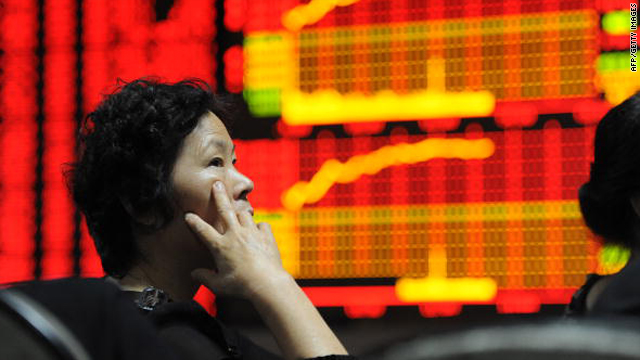 Asian markets fell following China's move to raise its benchmark interest rates. STORY HIGHLIGHTS
Asian markets fell following China's move to raise its benchmark interest rates. STORY HIGHLIGHTS- Asian markets fall following reaction of U.S. and European markets to China's rates decision
- People's Bank of China raised interest rates Tuesday, from 2.25 percent to 2.50 percent
- All three American indexes logged their biggest daily drops since August 11
Hong Kong, China (CNN) -- Asian markets fell on Wednesday, following the reaction of U.S. and European markets to China's decision to raise its benchmark interest rates by a quarter-percentage point.
Japan's Nikkei was down a little over 2 percent, China's Shanghai Composite Index was off 1.3 percent and Hong Kong's Hang Seng Index fell 1.65 percent. Korea's KOSPI was up slightly 0.05 percent.
"This is classic risk aversion from a market that was overdone," said Kirby Daley, senior strategist at Newedge Group. "The risk appetite was overdone, particularly in equities and dollar weakness. So, it wouldn't have taken much to tip the markets to a risk aversion correction, and that's what we're seeing right now. I am surprised that there wasn't a bigger move to the downside in some of the equity markets."
All three American indexes logged their biggest daily drops since August 11, with the Dow Jones industrial average losing 165 points, or 1.5 percent, the S&P 500 slipping 19 points, or 1.6 percent, and the tech-heavy Nasdaq shedding 44 points, or 1.8 percent. All major stock indexes in Europe turned lower on the news, too.
The People's Bank of China raised the rates on Tuesday, from 2.25 percent to 2.50 percent. It was the first hike since December 2007.
Unlike rate change statements from the U.S. Federal Reserve, the Chinese central bank's statement did not give any reason for the move, nor any commentary on its economic forecast.
China's economy has been growing rapidly even as western economies remain mired in sluggish growth. China's gross domestic product, the broadest measure of the economy, grew at a 10.3 percent annual rate in the second quarter, compared to the 1.7 percent rate in the United States.